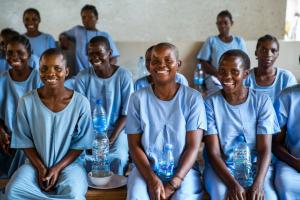Written by Kupona Foundation, and originally posted on Girls Globe.
As storytellers mobilizing support through narratives, we are acutely aware of our responsibility to do so without jeopardizing the privacy or dignity of the people we serve.
Today marks International Day to End Obstetric Fistula, and we’ve been reflecting on an important question: How do we, as fundraisers, clinicians and global health advocates, talk about fistula without imposing our own narrative and excluding women from their own stories?
How do we talk about fistula?
Obstetric fistula is one of the hardest global health topics to discuss. Women living with fistula are some of the most vulnerable in the world. Each has survived a prolonged, obstructed labor, which could have killed them, only to survive with lifelong morbidities.
Women who survive obstructed labor often lose their baby. The babies that survive can suffer lifelong neurological disease caused by reduced oxygen levels during labor. These babies may suffer paralysis and developmental deficits. In addition to the chronic incontinence that comes when a fistula develops, the women who survive this dangerous labor often experience foot drop, infertility, internal scarring that prevents normal sexual relations, and post-traumatic stress disorder.
When a woman returns home with a fistula she is constantly leaking urine, faeces, or both. As a result, she will often face stigma and rejection from her own family and community. Every day, we see the devastating effects harsh words from misinformed family and community members have had on the women who receive free, comprehensive treatment from our sister organization in Tanzania, CCBRT.
“Some of [my neighbors] said having children caused this, others told me I was being cursed by witchcraft”. ~ Fadhila
“My step father influenced my young siblings by telling them that my condition was contagious and that they should keep away from me. They were always laughing at me.” ~ Mercy
In addition to surgical and physical rehabilitation, CCBRT provides counselling and therapy to address the emotional and psychological scars left by fistula, and conducts national awareness raising campaigns to battle the misconceptions surrounding the condition.
Fistula in her words
We asked twenty women and girls undergoing treatment at CCBRT how they identify themselves and prefer to be identified – they chose words like ‘mama’, ‘businesswoman’, ‘entrepreneur’. Not one person wanted to be thought of as a ‘patient’ or a ‘victim’. The women and girls we serve do not want fistula to define them or their place in their community. It is imperative that we tell these women and girls’ stories on their terms.
The power of an international platform
Kupona and our partners are in a privileged position, able to raise the voices of women and girls who often struggle to make themselves heard even before they are faced with severe trauma. We are inspired by the strength and resilience of those we meet, and strive to communicate that when we amplify their stories.
“In meeting women and learning the stories of what they do to support their families, and how much they have overcome, I am amazed by their strength. I have met women like Christine. A woman of great self-worth, she built her life with little support, and today she stands tall because she found the care she needed with a skilled surgeon. I will always remember her – not as a victim, but as a strong, empowered woman who is a role model, and my hero.”
~ Kim Keller, Johnson & Johnson
We also try to hear our words as they would sound to women who have lived with fistula. Our goal is never to be sensational or graphic; it is always to elevate the voices of these women and girls, allowing them to share their stories in their own words.
“Women with fistula have suffered so much, so deeply. Many have been voiceless for too long, hiding their injury in shame. The very least we can do is choose our words carefully when it comes to discussing their condition or sharing their story, to be as respectful as we possibly can.” ~ Kate Grant, CEO, Fistula Foundation
As global storytellers, we are custodians of other people’s stories. We still have so much to learn, not just from these women, but from their families as well.
“While many women with fistula are abandoned by their husbands, in every fistula center you will find many husbands who support their wives, bringing food, clothes and news from home, talking to the nurses and doctors and celebrating the day that their wives are able to make the trip home. These men, whose stories are invisible and whose needs are not understood, are certain to have much to teach us. Imagine the value yet to be tapped if we were to expand our storytelling to include these husbands, from whose resilience and creativity we have much to learn.”
~ Dr. Lauri Romanzi, EngenderHealth
We want to learn from you too. Join us for the #HerWords Twitter Chat TODAY –Tuesday, May 23, 2017, 10 am ET – and share your thoughts on the power of language.
Kupona Foundation is CCBRT’s sister organization in the United States, mobilizing resources to enable the sustainable growth of their life-changing work in Tanzania. CCBRT’s comprehensive fistula program is one of the largest in the world. In 2016, over 1,000 women received treatment and holistic care for obstetric fistula at CCBRT Disability Hospital in Dar es Salaam, and 6 other partner facilities across Tanzania. Learn more atkuponafoundation.org
Cover photo credit: Sala Lewis



